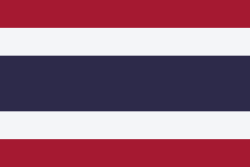 | ||||||||||||||||||||||||||
| Association | Thailand Kabaddi Association | |||||||||||||||||||||||||
|---|---|---|---|---|---|---|---|---|---|---|---|---|---|---|---|---|---|---|---|---|---|---|---|---|---|---|
| Confederation | Asian Kabaddi Federation (AKF) | |||||||||||||||||||||||||
| Head Coach | Somprach Phonchoo | |||||||||||||||||||||||||
| Captain | Khomsan Thongkam | |||||||||||||||||||||||||
| Most caps | Khomsan Thongkam | |||||||||||||||||||||||||
| World Cup | ||||||||||||||||||||||||||
| 3 (first in 2004 ) | ||||||||||||||||||||||||||
| Asian Games | ||||||||||||||||||||||||||
| 3 (first in 1998 ) | ||||||||||||||||||||||||||
| 6th (1998) | ||||||||||||||||||||||||||
| Asian Championship | ||||||||||||||||||||||||||
| Unknown (first in Unknown) | ||||||||||||||||||||||||||
| Unknown | ||||||||||||||||||||||||||
Medal record
| ||||||||||||||||||||||||||
The Thailand national kabaddi team represents Thailand in international kabaddi.
